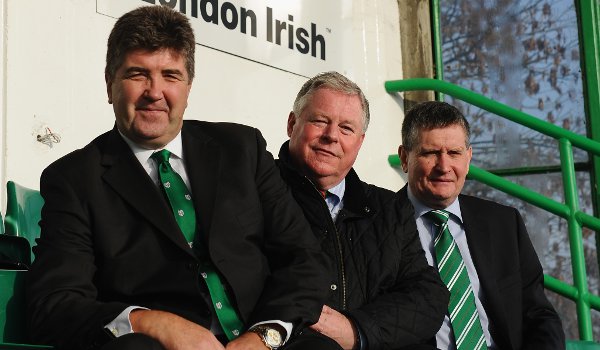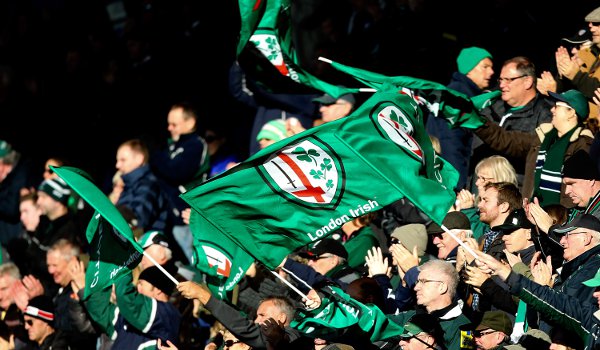THE MORE you look at most situations, the more you see that they are not black or white issues but instead varying shades of grey.
London Irish, as far as we are concerned, is not like that. To us, on first glance and after considerable thought over the years, it is a black or white situation. London should be just that – have a core of Irish players and play in London. If you’re not fulfilling either criteria then it’s simply not London Irish.
The pledged desire of the new owners to “make the club do what it says on the tin” is both welcome and the only sensible way forward.
There does, however, seem to be a level of ambiguity about how the club is going to more resemble the on-tin billing. The commitment to recruit more Irish players is hugely encouraging. Public statements that the club will continue to play in Reading are not so encouraging.
The club are tied into a deal with the Madejski Stadium until 2026 so, we can only hope, the owners are showing consideration to the commercial sensitivities of that deal when they voice their commitment to the Berkshire venue.
Also, they have to think about the local support base that has backed the club since they moved west at the beginning of the century. Naturally, many, if not most of the fans there on matchdays now, are locals. Of course, they’d rather the club stayed put.
 The new owners of London Irish from L-R: interim chief executive David Fitzgerald, President Mick Crossan and Phil Cusack at the London Irish Press Conference today
The new owners of London Irish from L-R: interim chief executive David Fitzgerald, President Mick Crossan and Phil Cusack at the London Irish Press Conference todayWith due respect to them and the magnificent support they have given, the only way they should be assured of seeing Premiership rugby in Reading is of the club is called Reading RFC. And it’s not Reading RFC, it’s London Irish.
It would be just the same if the situation was reversed. If there was a Premiership club called Reading and, a few years ago, they felt that their best option was to move to London, the capital-based locals could not really protest if Reading decided to return to their roots.
Sports clubs should live or die by who and what they are. Call us old-fashioned, but we don’t think moving city should be an option for anybody but baseball or gridiron teams. In this part of the world, teams are bound by their history and that is shaped by the towns they represent.
This argument that Irish people can easily get to Reading holds little water.
Anybody who has made the trek knows that it takes up your day. Paddington to Reading is less than half-an-hour. Most people don’t live in Paddington though. Then you have to get to the ground from Reading station. Then you have to do it all again on the way home.
Quite a number of people make this trip for every home game. Their loyalty can only be commended.
We respectfully disagree with Mick Crossan when he says that if you’re a supporter you will do what it takes to get to the game, travel over land and sea. He does this, for both Irish and Chelsea and fair dues to him for his commitment. Most fans aren’t like that though. Most don’t want to travel 50 miles for a home game and most won’t do so regularly. They’ll head out there for the St. Patrick’s Day game or the Christmas fixture, but that’ll be it.
Perhaps Crossrail will cut the journey time, but we don’t think it will solve the underlying problem from an Irish point of view.
Even if you invented teleportation and were able to beam fans from their front room to the East Stand of the Madejski in less than a second, the disconnect would linger. You’d still be watching a team that was London Irish in name and not in substance of locality and playing personnel.

Increasing the quotient of Irish players is a huge step in the right direction, but without a move back east it will be half a job.
We have been told by sources close to the club, who do not wish to be named, that they are keen to reconnect with their roots and are looking, in particular, at south-west London.
We hope the search is at an advanced stage and that the long lease with the Madejski Stadium can be cordially renegotiated.
The Madejski has been good for Irish, but Irish have been good for the coffers of the stadium too. That should be taken into account in any negotiations and the club, you would hope, would be showed requisite grace by their landlords.
It’s only natural that the new owners will have certain reservations about leaving Reading. It is a ground with fine facilities and the town is now the centre of the fanbase given that that is where the club have played in recent years.
Also, Irish sports fans have a reputation for being fickle. They’ll pack the place out to see a winning team, but aren’t so keen on following sides towards the bottom of the table. There is a degree of truth in that; however, we’d see this as more of a universal issue than an Irish one. People want glory these days.
But they also want to connect with a team that represents who they are.
We passionately believe that there is a huge latent support-base for London Irish within the M25. Anybody who has ever stood in Euston or Paddington when an Irish province are playing within striking distance will have been taken aback by the volume of London-based Irish rugby fans – all wearing red of Munster, the blue of Leinster, the white of Ulster, the green of Connacht.
Imagine all of those people dressed in a different shade of green. Imagine all of that fervour and emotion for rugby channelled not just into our teams from home, but for a club that truly represents who we are now.
From Kilburn to Clapham, Harrow to Wandsworth, Ealing to Archway, Eltham to Twickenham, we’re the London Irish. And we want our team back.

